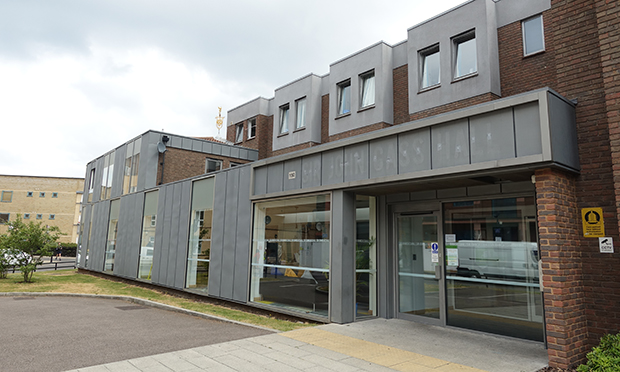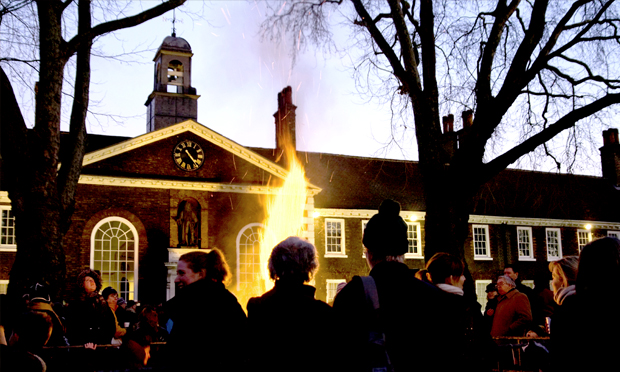Local charity praised for ‘good leadership’ after removing sign featuring name of Sir John Cass

A local charity has been praised for showing “moral courage and good leadership” after it removed a sign on its building featuring the name of slave trader Sir John Cass.
Cass and Claredale Halls of Residence Association, which uses land granted by Sir John Cass’s Foundation to provide student accommodation, took down the sign from the front of Sir John Cass Hall today.
The move followed a request from community educator Toyin Agbetu of Pan-African human rights-centred organisation Ligali.
It is understood that part of Sir John Cass’s wealth was acquired through his role as director of The Royal African Company, whose trade with Africa included enslaved people.
The Association’s chief executive Allan Hilton said it was not aware of Sir John Cass’s links to the slave trade, and is now “considering what options are available” to change the building’s name, which he suspects will require permission from the Foundation as freeholder.
Agbetu told the Citizen that the removal of the sign was “great news”, adding: “Even though we must wait for legal issues to be resolved before the building name can be changed, such action demonstrates moral courage and good leadership.
“I hope other educational, cultural and governmental institutions like Hackney Council are watching. It took one day for the London Metropolitan University leadership team to decide to rename their buildings and three days from my initial request for the Cass Hall of Residence team to do the same and take action.”
He continued: “I understand the process of bureaucracy can slow down the process of change but the Black Lives Matter protests highlight that addressing the issue of structural racism, like climate change, is a global emergency.
“Instead of the decades of delays of yesteryear, we should all be asking ourselves, when it comes to implementing solutions instead of talking about them, whether the mantra for our new normal must be, ‘If not now, when?'”
Hilton said: “The Association was given a very kind, charitable grant of this land on Well Street by Sir John Cass’s Foundation in 1982.
“This has enabled our Association, a small charity, to provide affordable, safe, secure and comfortable accommodation to thousands of students, over several decades, who have come to study in higher education in London.
“The property was named at its establishment in the early 1980s in recognition of that generous grant from Sir John Cass’s Foundation.
“Our Association was not aware of historical links that Sir John Cass may have had to the slave trade in the 1600s. Now that we have been made aware, we will look into the matter and consider what options are available to us. For example, we have now removed the large sign on the frontage above the entrance of the building.
“We suspect, however, that the naming of the building is an issue for the freeholder, which is Sir John Cass’s Foundation; as the lessee, we believe we are unable to change the name without the freeholder’s consent. We will pursue this, but it will take time.”
A statement from Sir John Cass’s Foundation reads: “We acknowledge some of the wealth of our Founder was gained by means of human exploitation and is not a source of pride.
“We hope our work today to promote and enable the education of disadvantaged young people in inner London can be a source of pride for the opportunities they bring to all those who benefit from our grants.
“More broadly, we continue to support and work with the independent institutions that carry the Cass name, where they wish us to do so.
“In most cases, the naming references the Foundation’s significant financial support in the institutions’ advancement in providing access to education for disadvantaged young people.”
The news comes in the wake of the toppling of slave trader Edward Colston’s statue in Bristol, and after Hackney Council this week announced a review into statues and place names across the borough.

The Museum of the Home, formerly the Geffrye Museum, is facing calls to take down a statue of Sir Robert Geffrye from above its entrance.
Geffrye was a merchant involved in the slave trade whose money was used to build the museum’s almshouses.
The museum, supported by the council, today announced a listening exercise that will ask locals for their views on what should happen to the statue, with a final decision expected to be made next month.
Director Sonia Solicari said: “We know that for many the statue of Robert Geffrye on the front of our building represents abuse, oppression and the history of thousands of enslaved people torn from their homes and families and forced to work in appalling conditions.
“We are partnering with Hackney Council to consult our communities about the future of the statue, how we tell the story of the origins of the Museum’s buildings and what the name Geffrye means to them – especially those who have found home in the streets and estate that bear his name.”
The consultation is expected to run separately to the Town Hall’s review, which will be established in the coming weeks and will involve residents, community partners and cultural historians.
Ligali’s Agbetu said on Wednesday in response to the announcement of the council’s review: “With respect, a review is not good enough. Bristol reviewed the matter for years and the government reviewed ‘BAME’ Covid-19 deaths.
“Now is the time to start acting for change and review together as we ride the social justice bus. Anything else is [the] grassroots sitting in the back as you steer.”
Mayor of Hackney Philip Glanville said today: “I know many have been demanding change for years, and I am determined to help now see that through.
“The anger and those urgent calls for action are understandable and right, but it’s also important that we make these decisions together, democratically, so that this moment in history has a legacy of progressive change for our borough.”
Further details about how locals and others concerned about this issue can have their say will be announced by the council in the coming days.
